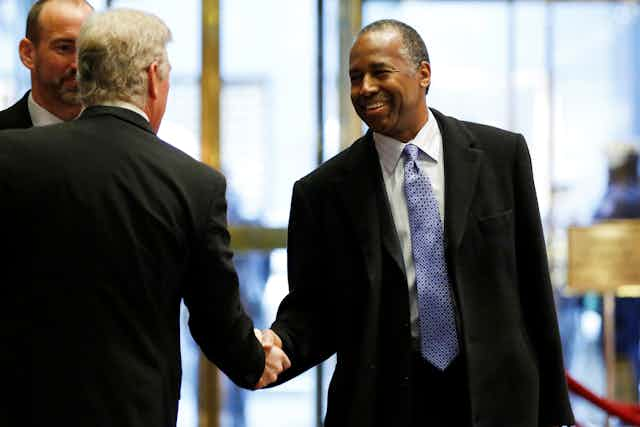Republicans are rushing to begin confirmation hearings for Cabinet appointments even before the FBI has finished its background checks. For President-elect Donald Trump’s opponents, this makes uncovering flaws in his nominees all the more challenging.
As a scholar of U.S. history, I have studied the many cases in which presidential nominees, particularly judges, have failed to gain Senate confirmation. However, according to the Senate Historical Office, there were four cases since 1970 in which a Senate controlled by the president’s party did not confirm the president’s nominees.
In each case, the failed nominee had either ethical, financial or legal lapses in their records. Here’s a list of their roadblocks, which might give you an idea of potential obstacles to Trump’s nominees.
Four failed nominations
In 1993, President Bill Clinton nominated Zoe E. Baird to be attorney general. Only five days later she asked Clinton to withdraw her nomination.
Her candidacy stumbled on the disclosure that she had hired undocumented immigrants and had not paid appropriate taxes on their wages. Particularly galling to opponents was the idea of the nation’s chief law enforcement officer having broken the law. As The New York Times put it, there “must be a natural fit between a job and the ethics, background, finances, and talents of a nominee.” Clinton nominated, and the Senate confirmed Janet Reno instead.
In 2001, President George W. Bush’s nomination of Linda Chavez to be secretary of labor was similarly short-lived. She had offered shelter and financial support to an undocumented immigrant.

Although she denied employing the immigrant, the revelation raised questions for senators and the public about her candidacy. Her nomination may also have been at risk due to the resistance of organized labor to her record on the minimum wage, affirmative action and sexual harassment. She quickly asked that her nomination be withdrawn under pressure about conflicting statements she made about her knowledge of the immigrant’s legal status. Elaine Chao, whom Trump has nominated to be secretary of transportation, served as Bush’s first secretary of labor instead.
George W. Bush ran into trouble again when he nominated Bernard Kerik to head the Department of Homeland Security in 2004. Unpaid taxes on domestic workers of unclear immigration status precipitated Bush’s decision to withdraw Kerik’s name. The Senate later confirmed Michael Chertoff as secretary of homeland security.
Given how many times employing undocumented immigrants has imperiled Cabinet nominees, the Trump transition team has presumably been attentive to the hiring records of its nominees.
But there are other issues the transition team may have failed to anticipate.
For example, President Barack Obama’s nomination of Senator Tom Daschle to be secretary of health and human services was sunk by unpaid taxes on a limo service as well as consulting income. Particularly troubling was the source of the car and driver – a political supporter, which may have been one reason his nomination failed. Observers also raised questions about Daschle’s close ties to the health care industry that the department hoped to reform. Kathleen Sebelius joined Obama’s Cabinet instead.
Nevertheless, unpaid taxes didn’t stop Timothy Geithner from becoming secretary of treasury in 2009. His confirmation suggests the timing and scale of an ethical lapse could make or break Trump’s nominees.
Opportunities in the coming weeks
Focusing on nominees whose qualifications do not correspond to the job description is one potential strategy for opponents. For example, Ben Carson, a retired neurosurgeon and author, seems a poor fit for the Department of Housing and Urban Development. But convincing Republicans to override their leader on this basis seems unlikely.
More often, conflicts of interest, past statements or lapses in judgment preclude confirmation. Nominees’ ethical records could be where they are most vulnerable. For example, Sen. Jeff Sessions, nominee to be attorney general, has come under attack from former colleagues and observers in the press for omissions in a questionnaire he submitted to the Senate Judiciary Committee.
Ethics has been salient in Trump’s call to “drain the swamp,” and the recent flap over Republican efforts to downgrade the Office of Congressional Ethics. Ethical lapses, therefore, could jeopardize Trump’s nominees in the coming weeks and months. Although the president-elect has faced criticism for past and potentially future conflicts of interest, the voters elected him despite these concerns.
It remains to be seen if the Senate will hold Cabinet nominees, who can’t claim a popular mandate, to a higher standard.
Editor’s note: This story was updated to clarify that the analysis is based on the Senate Historical Office’s list of nominations that were officially filed with the Senate.

